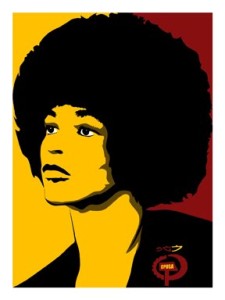For the past few months I’ve been reading and hearing disturbing accounts of black women being shamed or made to feel ugly because of the darkness of their skin, the kinkiness of their hair, the fullness of their lips or noses, or the curviness and voluptuousness of their bodies. This isn’t just happening in America, it’s happening in Brazil, Cuba, Africa, Jamaica, the Dominican Republic – any place where there are darker hued people. To me, it’s a reminder of how deeply rooted racism, colorism, and self hate really is. In Louisiana for an example, it is a fact of life that those deemed Creole, who are basically light skinned (might as well throw in “with good hair”) do not associate with those who are darker skinned. They won’t even allow a darker skinned person in a photo with them, let alone stand up in their wedding! In 2016 this is still happening, and it blows my mind.
In Brazil, there’s a young woman named Nayara Justino who is a model and actress. She made history by being the first dark skinned woman named Carnival Queen. Sadly, she was stripped of her title because of the racist outrage over her dark skin. The people wanted the tradition to continue of only crowning a lighter skinned Brazilian woman. This poor woman was called every racist name in the book on social media, and the judges cowardly caved into the public outcry and stripped her of her crown and giving Nayara no reason for doing so. Much later they denied taking her crown because of the color of her skin, even though everyone knows that’s exactly the reason why. Let’s be real – if the public never had a problem with her being Carnival Queen, she’d still have her crown, right? Right.
I hate hearing and reading about these things, but I’m glad for social media because without it we’d never hear about these things happening. Mainstream media never report about these types of things because they want you to believe that the world isn’t as racist as it is. Well you’d have to be living under a rock to not know that racism in America and in other countries is alive and well. It’s this narrow-minded thinking that keeps black women and women of color from loving everything about themselves. This is why it’s so hard for women to even attempt to love their natural kinky, coily hair because all they hear and see on tv and in print ads is that straight, long hair is the only hair that is beautiful, and it’s the only hair you should want. Curls and kinks are ugly, unkempt looking, and wild. Just writing this makes me cringe at how ridiculous this thinking is, but it’s out there and the roots run deep in the minds of many black women and black men.
Recently I watched the documentary The Black Panthers: Vanguard of the Revolution on PBS. During the 1960’s and 1970’s there was a call for black pride because of the hideous racism and persecution taking place against blacks at the hands of white people. Loving ourselves, our culture, skin color, and natural hair were just some of things that were encouraged by the Black Panther Party. Seeing all of those beautiful, natural afros of various sizes, textures, and colors in this documentary made me smile. It made me swell with pride because all of these people looked like me, they had hair like me and they wore it proudly. After the demise of The Black Panther Party, that pride in our natural hair practically disappeared as chemical relaxers and Jheri Curls took over. Fast forward to today and you have black women once again saying no to putting harmful chemicals in their hair and yes to proudly wearing their natural hair. Many call it a movement, others call it a fad. Ask the manufactures of chemical relaxers and beauty salons about their sales for the past ten years and they’ll tell you it’s not a fad. Today, women are more informed and aware of the harmful side affects that chemical relaxers cause. There is a plethora of information all over the internet at our disposal to educate ourselves with. So no, this is not a fad. This is a lifestyle change and natural hair is here to stay.
Collectively as women, we need to help and encourage each other whether if we are natural or not. Don’t look down on those who aren’t natural, be encouraging. Remember, most of us were addicted to the creamy crack for many years too! Don’t preach to them, be informative. Compliment one another and be an example. Be willing to discuss your hair journey if given the opportunity. Your story could help someone else make that final decision to go natural. Before I went natural, when I would see black women rocking their afros, afro puffs, or twist outs, I always felt their hair was beautiful. I felt a sense of pride seeing them rock their natural hair because I always felt our natural hair is beautiful. I wouldn’t hesitate to compliment them and tell them how beautiful their hair was. Then I had to look at myself and ask “If you know natural hair is beautiful and it’s healthier for you, what’s keeping you from going natural?” I had no answer, and I had no excuse because there was nothing holding me back. My daughters were natural, so again, what was holding me back? Nothing. I got educated and I took the plunge. I big chopped.
There is nothing wrong with loving our culture. There is nothing wrong with loving our blackness. And there is definitely nothing wrong with loving ourselves and our natural hair.

